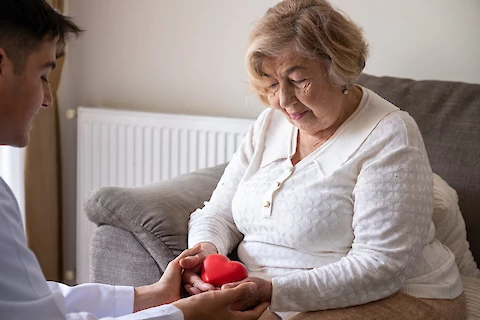
American Heart Month is a time dedicated to raising awareness about the importance of heart health, particularly among senior women. As we age, understanding the potential risks becomes even more critical. It signals our bodies give us, especially concerning the heart.
Learn how to recognize the symptoms of a heart attack in women, identify signs of cardiovascular health issues, and determine if you have already had a myocardial infarction.
Learning About Heart Attacks
Myocardial infarction (MI) occurs when the blood flow to a part of the heart is blocked, usually by a blood clot. This blockage can damage or destroy part of the heart muscle. While media often portray cardiac episodes as dramatic, pain-filled experiences, the reality can be quite different. It's not uncommon for individuals to experience mild symptoms or even none at all, leading to silent ischemia.
How Do Cardiovascular Incidents Manifest?
The symptoms of a cardiac emergency can be subtle and sometimes different from those experienced by men. Heart attacks in women manifest as:
- Discomfort in the back, jaw and upper abdomen
- Shortness of breath
- Nausea
- Vomiting
- Lightheadedness
- Breaking out in a cold sweat
- Unexplained fatigue
- Sleep disturbances can also be warning signs
It's important to recognize these symptoms for what they are and seek immediate medical attention. Symptoms are different for everyone and should be taken seriously, regardless of whether you have a history of heart disease or have been healthy all your life.
Signs of Coronary Health Concerns
Cardiovascular health concerns are conditions that impact your heart and blood vessels. These can lead to severe events such as cardiac episodes and strokes. Warning signs can include:
- High blood pressure
- Irregular heartbeat
- Swollen feet or ankles
- Difficulty doing physical activities that used to be easy
Regular check-ups are crucial for the early detection of cardiovascular health issues before they escalate into more critical conditions.
How to Know if You’ve Had a Cardiac Emergency After the Fact
This part is tricky, as you may have had a myocardial infarction without even knowing it. Post-cardiac episode symptoms can include:
- Fatigue
- Reduced exercise tolerance
- Lingering discomfort in your chest
If you suspect you've had coronary distress, seek immediate medical attention. Your healthcare professional may conduct various tests, such as blood tests, an electrocardiogram, or a cardiac enzyme test, to confirm if a past cardiovascular episode occurred.
Senior Helpers Offers Compassionate Senior Care
Spreading awareness of heart attacks in women should not be taken lightly, especially as we age. Coronary disease is the leading cause of death among women in the United States, but being proactive and recognizing the signs can make all the difference.
At Senior Helpers of Greater Dallas, we are committed to making life easier and safer for seniors in Dallas, Richardson, Farmers Branch, University Park, Lakewood Area, and beyond. Contact us to learn more about our senior care services, such as companion and respite care.